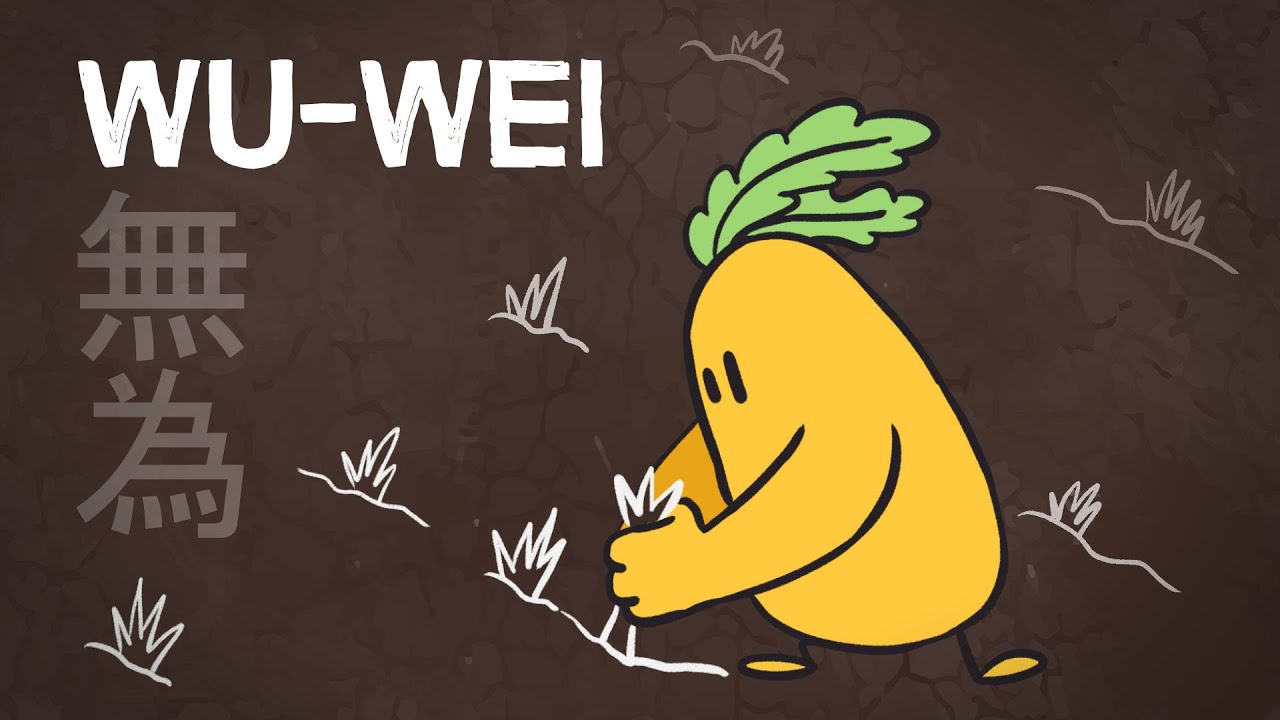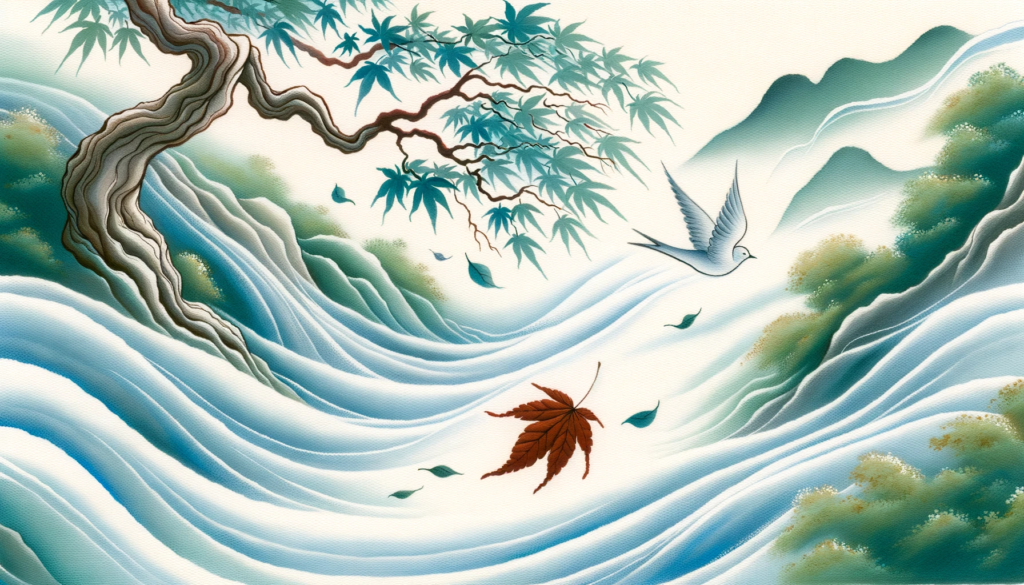
Introduction
Wu Wei in the Modern World: Embracing Effortless Action
Intended Audience and Purpose
This article is designed for individuals seeking deeper understanding of personal growth, spiritual exploration, mindfulness, and Eastern philosophies. Whether you’re someone striving for more balance in a fast-paced world, curious about Taoist teachings, or looking to apply ancient wisdom to modern living, this exploration of Wu Wei will provide valuable insights. The purpose is to introduce the concept of Wu Wei, explore how it can be applied in daily life, and highlight its profound benefits in the context of modern society.
Overview of Wu Wei
At its core, Wu Wei (無為), a fundamental principle in Taoism, translates to “non-action” or more accurately, “effortless action.” It encourages alignment with the natural flow of life, where actions arise spontaneously and in harmony with the environment, without forcing outcomes or resistance. In contrast to inactivity or passivity, Wu Wei advocates for mindful participation in the world, where we act with ease, free from overexertion or unnecessary control.
Wu Wei is derived from the teachings of Laozi (Lao Tzu) in the Tao Te Ching, where the Tao, or “the Way,” represents the fundamental order of the universe. In the Taoist worldview, everything in nature follows the path of least resistance, achieving its purpose effortlessly. Water, one of the most frequently used metaphors in Taoist philosophy, embodies Wu Wei by flowing around obstacles, adapting to its environment while maintaining its nature.
Why It Matters
In today’s fast-paced, achievement-oriented culture, the concept of Wu Wei may seem foreign or even counterintuitive. Society often equates success with relentless effort, productivity, and constant striving. However, this hyper-focus on output frequently leads to stress, burnout, and a sense of disconnection from one’s true self. Many people find themselves constantly pushing against the current of life, which can create frustration, overwhelm, and diminished well-being.
Wu Wei offers a refreshing counterbalance to these pressures. By emphasizing harmony with the natural flow of life, it encourages us to move away from the forceful pursuit of outcomes and toward a more intuitive, responsive way of living. In this context, success and fulfillment arise not from controlling every aspect of life, but from recognizing when to act and when to step back.
This philosophy is especially relevant for those navigating the complexities of modern life—whether in careers, relationships, or personal growth. Practicing Wu Wei can lead to enhanced mental clarity, reduced stress, improved relationships, and more meaningful, effective decision-making. In a world that often celebrates hustle, Wu Wei reminds us of the power of stillness, ease, and trust in the natural course of events.
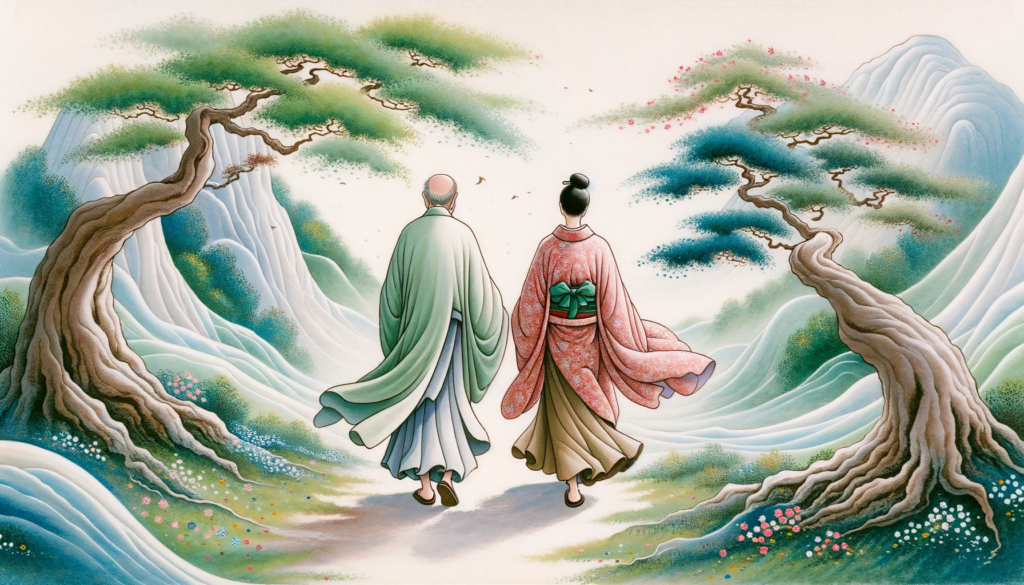
What Is Wu Wei?
Definition
Wu Wei (無為), a foundational principle in Taoist philosophy, is often translated as “non-action” or “action without effort.” However, these translations can be somewhat misleading because they suggest passivity or inactivity, which is not the essence of Wu Wei. More accurately, Wu Wei refers to effortless action, or action that is perfectly aligned with the natural flow of events. It is about moving in harmony with the rhythm of life, acting when it’s appropriate and stepping back when needed, without imposing force, resistance, or excessive control.
At its core, Wu Wei means that the most effective and meaningful actions are those that occur in sync with the world around us, requiring minimal effort because they arise from a deep understanding of natural patterns. Rather than being rigid or forceful, Wu Wei is a dynamic state of responsiveness, where one adapts to circumstances effortlessly, much like a river flowing smoothly around rocks.
Origins
The concept of Wu Wei finds its roots in Taoism, a spiritual and philosophical tradition that originated in China around the 6th century BCE. It is most closely associated with Laozi (Lao Tzu), the sage who authored the Tao Te Ching, a classic Taoist text that outlines the central teachings of Taoism.
In the Tao Te Ching, Laozi describes the Tao (the Way) as the underlying, mysterious force that governs the universe. Everything in the natural world moves according to the Tao, and the key to a harmonious life is to live in accordance with this universal order. Wu Wei is the practical expression of this harmony. By practicing non-forced action, one aligns with the Tao, allowing life to unfold naturally, without unnecessary struggle or conflict.
Laozi emphasizes that human effort, when disconnected from the natural flow of the universe, often results in frustration, inefficiency, and resistance. Instead, Wu Wei teaches us to act only when action is needed, with a sense of ease and acceptance. This principle is seen as the highest form of wisdom, where the individual merges with the Tao, and life becomes a seamless, graceful experience.
Distinction from Laziness
It’s easy to misinterpret Wu Wei as a form of laziness or inactivity. However, this is a fundamental misunderstanding of the concept. While laziness refers to avoiding action due to indifference or lack of motivation, Wu Wei involves deliberate, purposeful non-action that arises from an acute awareness of the right timing and circumstances.
Laziness typically stems from a desire to avoid effort or responsibility. It often leads to procrastination, disorder, and missed opportunities. In contrast, Wu Wei is not about avoiding effort but about making effortless efforts—actions that are in perfect alignment with the natural course of events. It requires sensitivity, mindfulness, and presence to recognize when to act and when to refrain from action.
Wu Wei also implies that, when the time is right to act, action is taken with efficiency and precision, not reluctance. It embodies the art of doing the right thing at the right moment with the least amount of resistance or force. For example, consider an athlete who performs at their peak when they enter a state of “flow”—they are not overthinking or forcing their movements; everything comes naturally, instinctively. This is the essence of Wu Wei in action.
Thus, while laziness is rooted in avoidance, Wu Wei is rooted in wisdom and the ability to act in harmony with the natural flow of life, resulting in outcomes that are often more effective and sustainable. It is a proactive, skillful form of action, not its absence.
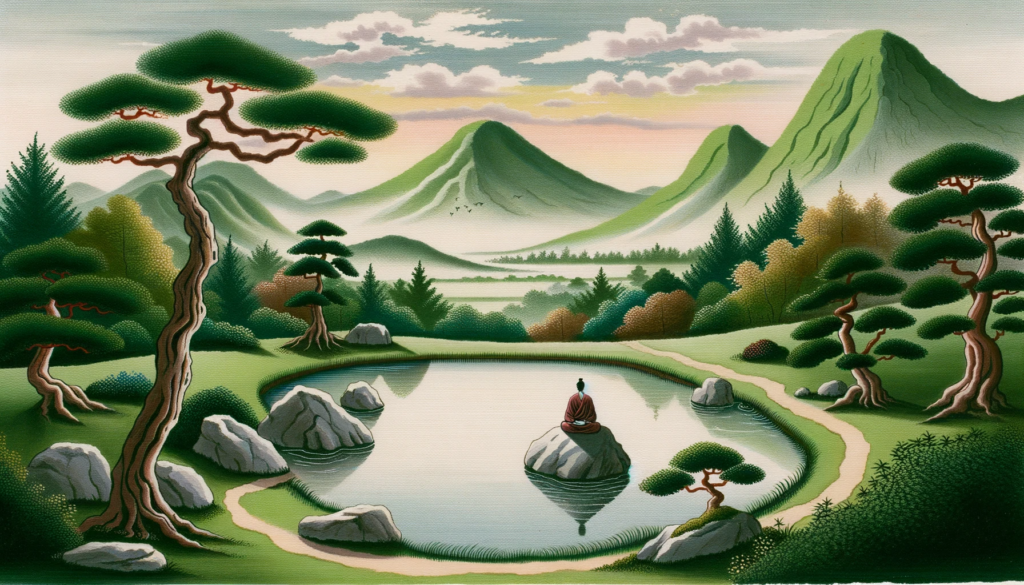
What Does Wu Wei Really Mean?
Effortless Flow
At its core, Wu Wei is about achieving a state of effortless flow, where actions arise naturally without force, struggle, or resistance. This principle suggests that life, when lived in harmony with the natural world, unfolds with ease. Rather than trying to bend circumstances to fit one’s will, Wu Wei advocates letting go of the need for control and allowing things to happen in their own time and way.
Effortless flow doesn’t mean doing nothing or remaining passive; it means acting in tune with the moment. In this state, actions are not labored, but arise spontaneously and appropriately from the context. It’s the difference between swimming upstream—expending excessive energy to fight against the current—and letting the current carry you downstream with minimal effort. Wu Wei invites us to recognize that forcing things often leads to unnecessary friction and depletion, while acting in alignment with the natural order allows for smooth, efficient progress.
In daily life, this could mean solving a problem by first observing and understanding the situation rather than immediately trying to impose a solution. It could also involve knowing when to pause and reflect, allowing creative or intuitive ideas to emerge naturally rather than overthinking or overplanning.
The State of Being
Wu Wei goes beyond a specific action or approach; it is a state of being. In Taoist philosophy, this state of being is one of alignment with the Tao, the natural way or the universal flow that governs all life. The Tao cannot be fully understood or explained—it is a force that shapes the universe. To practice Wu Wei is to live in accordance with this invisible, guiding principle.
In this state, individuals do not resist life’s natural rhythms or try to force outcomes. Instead, they trust in the wisdom of the Tao, recognizing that the universe has its own timing and order. The Taoist perspective suggests that the more we try to control life—whether in relationships, work, or personal pursuits—the more we find ourselves at odds with it. But when we release that need for control and align ourselves with the Tao, life unfolds effortlessly, and we find ourselves acting at the right time and in the right way.
In essence, practicing Wu Wei means developing the ability to surrender to the flow of life while still remaining engaged and aware. It is a form of active receptivity: being present, responsive, and adaptable to what life presents without forcing things or becoming attached to specific outcomes. This is a subtle but powerful shift in how one approaches challenges, decisions, and everyday actions.
Examples from Nature
Nature provides some of the most profound illustrations of Wu Wei. The natural world operates without force or struggle, effortlessly achieving balance and growth. Here are two key examples that embody the essence of Wu Wei:
- Water Flowing Around Obstacles Water is one of the most commonly cited metaphors for Wu Wei. It flows smoothly around rocks and obstacles in its path, adjusting effortlessly without losing its direction. Rather than trying to overcome or fight the obstacles, water follows the contours of the environment, shaping itself to fit the situation. Yet, over time, water is capable of wearing down even the hardest of rocks, not by force, but by persistence and adaptability. This symbolizes how Wu Wei functions in life—by adapting and flowing with the circumstances, we can achieve our goals with minimal resistance and force.
- Trees Growing Toward the Sun A tree does not struggle to grow; it simply grows in accordance with its natural environment. The tree’s roots seek water, and its branches reach for sunlight without effort or planning. This growth is not hurried, and the tree doesn’t fight against the elements—it adapts to them. When the wind blows, the tree bends rather than breaks, demonstrating resilience and flexibility. This effortless striving for nourishment and light represents the harmony and natural progression of life when one aligns with Wu Wei.
In both examples, nature shows us that growth, movement, and progress are achieved without forceful exertion. There is no struggle against the natural flow of things—only a harmonious response to the environment. When humans learn to emulate this effortless action in their own lives, they too can experience greater ease and balance in the way they move through the world.
Wu Wei teaches us that by trusting the flow of life, we can achieve a state of grace where actions come naturally, without force or undue effort. This philosophy reminds us that the most profound outcomes are often achieved not through relentless striving, but through patient, mindful alignment with the natural rhythms of life.

Why Is It Important to Learn Wu Wei in the Modern World?
Counteracting Overexertion
In today’s society, there is a cultural obsession with constant hustle, productivity, and achievement. People are often praised for working long hours, multitasking, and relentlessly pursuing success, but this lifestyle comes with significant costs—both physically and mentally. The pressure to always do more, achieve more, and control every aspect of life leads many to feel overwhelmed and burned out. Stress, anxiety, and fatigue have become widespread, with individuals finding themselves caught in a cycle of overexertion.
Wu Wei offers a much-needed antidote to this relentless pursuit. It reminds us that we don’t need to force success or outcomes to be effective. Instead, we can approach life with a sense of ease and natural flow, focusing on working smarter, not harder. This shift in mindset encourages us to prioritize balance over blind ambition, and to recognize that constant pushing often creates more friction and stress, rather than sustainable success.
By learning and practicing Wu Wei, we can counterbalance the extremes of modern overexertion and reduce the negative impacts of the hustle culture. It teaches us to slow down, conserve energy, and act only when it feels natural and aligned with the circumstances. This not only leads to more efficiency but also creates a healthier, more enjoyable relationship with work and life.
Psychological and Physical Well-being
One of the most significant benefits of incorporating Wu Wei into daily life is the profound improvement in psychological and physical well-being. The constant demand to force outcomes, meet deadlines, and control every detail creates chronic stress, which has well-documented negative effects on both mind and body. Prolonged stress contributes to a host of issues, including insomnia, anxiety, depression, weakened immunity, and even cardiovascular disease.
Wu Wei encourages us to let go of unnecessary control and to trust in the natural flow of events. By doing so, we can significantly reduce the anxiety that arises from feeling responsible for everything. When we stop forcing outcomes, we allow space for things to unfold naturally, and this reduction in stress has a cascading effect on our overall health. The body relaxes, the mind becomes calmer, and we find it easier to cope with life’s challenges. Instead of constantly worrying about the future or obsessing over results, we can enjoy the present moment and experience greater peace of mind.
Physically, this philosophy promotes a relaxed state of being, which has numerous health benefits. Our bodies are designed to thrive in states of balance, and when we embrace Wu Wei, we move away from constant overdrive and allow our bodies to recover, heal, and maintain optimal health.
Enhancing Creativity and Decision-making
Wu Wei also plays a pivotal role in enhancing creativity and improving decision-making. Creativity flourishes not under pressure, but in a state of relaxation and openness. When the mind is free from rigid structures and forced goals, it is better able to tap into inspiration, intuition, and fresh ideas. This is why some of the best creative breakthroughs often occur when people are not consciously trying to solve a problem—whether in the shower, on a walk, or during a moment of stillness.
By practicing Wu Wei, we learn to let go of the need to force creativity. Instead of overthinking or pressuring ourselves to come up with solutions, we cultivate an environment where ideas can flow naturally. This relaxed mental state creates space for innovation and insight. When we stop forcing solutions, we become more open to receiving them.
Similarly, decision-making becomes clearer and more intuitive when we adopt a Wu Wei approach. Often, the stress of trying to control every detail clouds our judgment and leads to impulsive or poorly considered choices. However, when we practice Wu Wei, we become more in tune with the natural timing and flow of situations. Decisions are made with greater clarity because they arise from a place of awareness and patience rather than haste or anxiety. This can lead to more thoughtful and effective outcomes in both personal and professional contexts.
In the modern world, where overexertion, stress, and anxiety are common, learning the philosophy of Wu Wei is a powerful way to restore balance and well-being. It teaches us to move away from the culture of constant hustle and towards a more harmonious, sustainable way of living. The benefits are profound: reduced stress, improved health, enhanced creativity, and clearer decision-making. By embracing the effortless flow that Wu Wei offers, we can experience a more peaceful, fulfilling, and successful life.
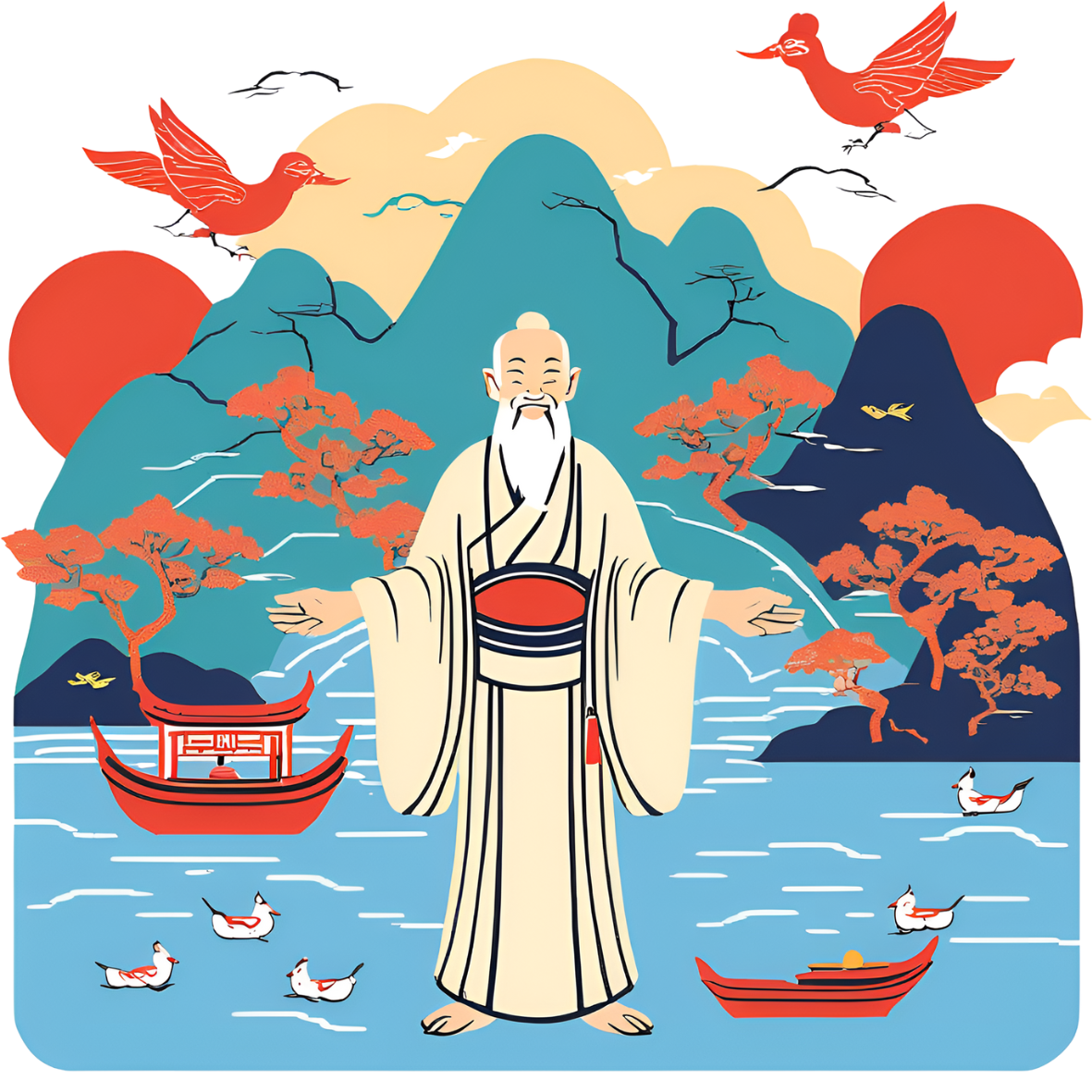
Is Wu Wei a Form of Laziness or Something Beyond?
Laziness vs. Intelligent Non-action
One of the most common misunderstandings about Wu Wei is its association with laziness or passivity. On the surface, the idea of “non-action” may seem like an invitation to do nothing, but this interpretation misses the depth and subtlety of the concept. Laziness is typically driven by a desire to avoid responsibility or effort, resulting in inactivity that lacks purpose or direction. In contrast, Wu Wei is the art of intelligent non-action, where actions are deliberate, mindful, and arise in harmony with the natural flow of events.
Wu Wei does not promote passivity or avoidance. Rather, it encourages us to act when the time is right and to refrain from acting when it’s unnecessary or counterproductive. It is about recognizing the most efficient and effective way to engage with life. In this sense, Wu Wei is deeply aligned with wisdom and awareness—it’s knowing when action is required and, more importantly, knowing when to step back.
To fully grasp Wu Wei, it’s essential to understand that it involves a high level of mindfulness and presence. Practitioners of Wu Wei are not avoiding work or responsibility; they are simply acting in accordance with what the moment demands. The result is that effort is minimized, yet the outcomes are often more productive and impactful than if they were forced.
For example, imagine a manager who insists on micromanaging every detail of a project, constantly pushing their team to meet deadlines. This creates tension, overwork, and often leads to mistakes. Now compare that to a manager who practices Wu Wei—observing when their intervention is necessary and stepping back when the team is capable of self-regulation. The second manager uses intelligent non-action, fostering a more efficient, collaborative, and creative environment.
Case Studies: Real-world Examples of Wu Wei in Action
Case Study 1: Google’s “20% Time” for Creative Innovation
A prime example of Wu Wei in the business world can be seen in how companies like Google have implemented policies that embrace the principles of intelligent non-action. Google famously introduced a policy allowing employees to spend 20% of their time working on side projects of their choice, rather than on their primary job responsibilities.
This approach is a modern application of Wu Wei. Rather than forcing employees to innovate on a strict timeline, Google’s 20% Time policy creates an environment where creativity unfolds naturally. Employees are given space to explore ideas without the pressure of immediate outcomes, and as a result, some of the company’s most successful products—such as Gmail and Google Maps—emerged from these efforts. This illustrates how letting go of rigid control and giving employees the freedom to follow their interests can lead to remarkable innovation.
Case Study 2: The Success of Patagonia’s Sustainable Practices
Another real-world example comes from the outdoor clothing company Patagonia, which practices a form of corporate Wu Wei by adopting a “less is more” approach to business growth. Instead of following the traditional path of relentless expansion and profit maximization, Patagonia emphasizes sustainability, conservation, and mindful production practices.
Founder Yvon Chouinard has famously encouraged customers to buy less and repair their old gear rather than purchase new items. This strategy may seem counterintuitive for a business, but it aligns with the principles of Wu Wei—doing what is necessary and nothing more. By focusing on quality, durability, and environmental responsibility rather than short-term profits, Patagonia has cultivated a loyal customer base and a highly respected brand.
Patagonia’s approach exemplifies effortless efficiency—they act in harmony with their values, not forcing growth, but allowing it to happen naturally as a result of thoughtful, responsible decisions. In this way, the company demonstrates that Wu Wei is not about laziness but about mindful, purposeful action that leads to long-term success.
Case Study 3: Aikido – The Martial Art of Non-resistance
Aikido, a Japanese martial art, is another profound example of Wu Wei in action, illustrating how non-resistance can be more effective than brute force. In Aikido, the practitioner doesn’t meet aggression with aggression. Instead, they blend with the attacker’s energy and use it to deflect or neutralize the threat.
This is a perfect embodiment of Wu Wei in physical form—rather than forcing a counterattack, the Aikido practitioner harmonizes with the movement of the opponent, allowing the conflict to resolve with minimal effort. It demonstrates that, by avoiding resistance and unnecessary force, one can achieve powerful outcomes with grace and efficiency.
Wu Wei is not laziness. It’s about learning to navigate life with a sense of wisdom, mindfulness, and minimal resistance. The examples above show how Wu Wei can be applied across different areas—whether in business innovation, sustainability, or martial arts—and demonstrate that intelligent non-action is often more effective than forceful effort.
By understanding the true nature of Wu Wei, individuals and organizations can unlock new levels of creativity, success, and well-being without succumbing to the trap of overexertion or inactivity. Instead of fighting against the current of life, Wu Wei teaches us to move with it, producing results that are both efficient and harmonious.

The Mindset Required to Follow Wu Wei
Letting Go of Control
A key aspect of practicing Wu Wei is the ability to let go of control. Modern life often encourages us to manage, plan, and control every detail to ensure success, whether in work, relationships, or personal growth. However, Wu Wei asks us to cultivate an attitude of trust in natural processes. It’s about relinquishing the constant urge to micromanage and allowing things to unfold as they will.
Letting go of control does not mean abandoning responsibility or care. Instead, it means accepting that not everything can or should be controlled. This mindset helps reduce the frustration, anxiety, and stress that often come from trying to impose one’s will on situations that are beyond one’s influence. By adopting a more flexible, observant stance, we are able to engage more effectively when action is required, and step back when it is not.
This shift in mindset encourages us to approach life with a sense of curiosity and openness, rather than rigid expectations. The practice of non-attachment to specific outcomes fosters resilience, as we learn to respond to challenges and changes with ease rather than resistance.
Patience and Trust
Another essential mindset for Wu Wei is patience—the ability to let life unfold without rushing or forcing things. In a world where speed and immediate results are often valued, this can be challenging. However, Wu Wei teaches that trust in oneself, others, and the universe is critical for finding harmony. This trust allows for patience, as we understand that things have their own natural timing and rhythm. Forcing progress can create unnecessary friction, while waiting for the right moment leads to smoother and more effective outcomes.
Building this trust requires developing an inner sense of calm. When we are constantly anxious or reactive, we are more likely to push for quick fixes or impose control. Practicing patience means learning to step back, observe, and allow events to develop naturally. This can apply to personal growth, creative endeavors, or problem-solving, where the best solutions often arise when we stop trying to force them.
Trusting the natural flow of life also means having faith in our ability to respond to whatever comes our way. Rather than fearing uncertainty or change, Wu Wei encourages us to see life’s challenges as opportunities for growth, with the understanding that we have the capacity to adapt and thrive without constant control.
Open-mindedness
Open-mindedness is a crucial trait for anyone seeking to embody Wu Wei. It involves the ability to observe without immediate judgment or reaction, allowing oneself the space to reflect before acting. This contrasts sharply with the impulsive, reactionary behavior that many people fall into when they feel pressured or stressed.
The mindset of Wu Wei calls for mindful awareness—being present in the moment and noticing what is happening without jumping to conclusions. It requires practicing non-judgmental observation, where we can see a situation clearly and recognize whether action is necessary or if it’s better to wait. This creates the space to respond thoughtfully rather than react out of habit or emotion.
Open-mindedness also allows us to adapt to the unexpected twists and turns of life. When we are too rigid in our thinking or overly attached to specific outcomes, we can become frustrated or resistant to change. However, by maintaining an open mind, we can more easily flow with life’s uncertainties, adjusting as needed while staying true to the principles of Wu Wei.
In daily practice, this means being open to new perspectives, embracing flexibility, and being willing to pause and reflect before taking action. It’s the ability to step back, assess the situation, and only intervene when the time is right. In this way, open-mindedness becomes a tool for both personal growth and more effective engagement with the world around us.
The mindset required to practice Wu Wei is one of trust, patience, and openness. Letting go of control means understanding that not everything needs to be forced and that life often unfolds more smoothly when we stop micromanaging every detail. Patience teaches us to wait for the right moment rather than rushing into action, while trust reassures us that things will fall into place naturally. Open-mindedness helps us remain flexible and responsive, allowing us to observe and act only when necessary. Together, these qualities foster a sense of flow and harmony with life’s natural rhythms, leading to more effective and less stressful engagement with the world.
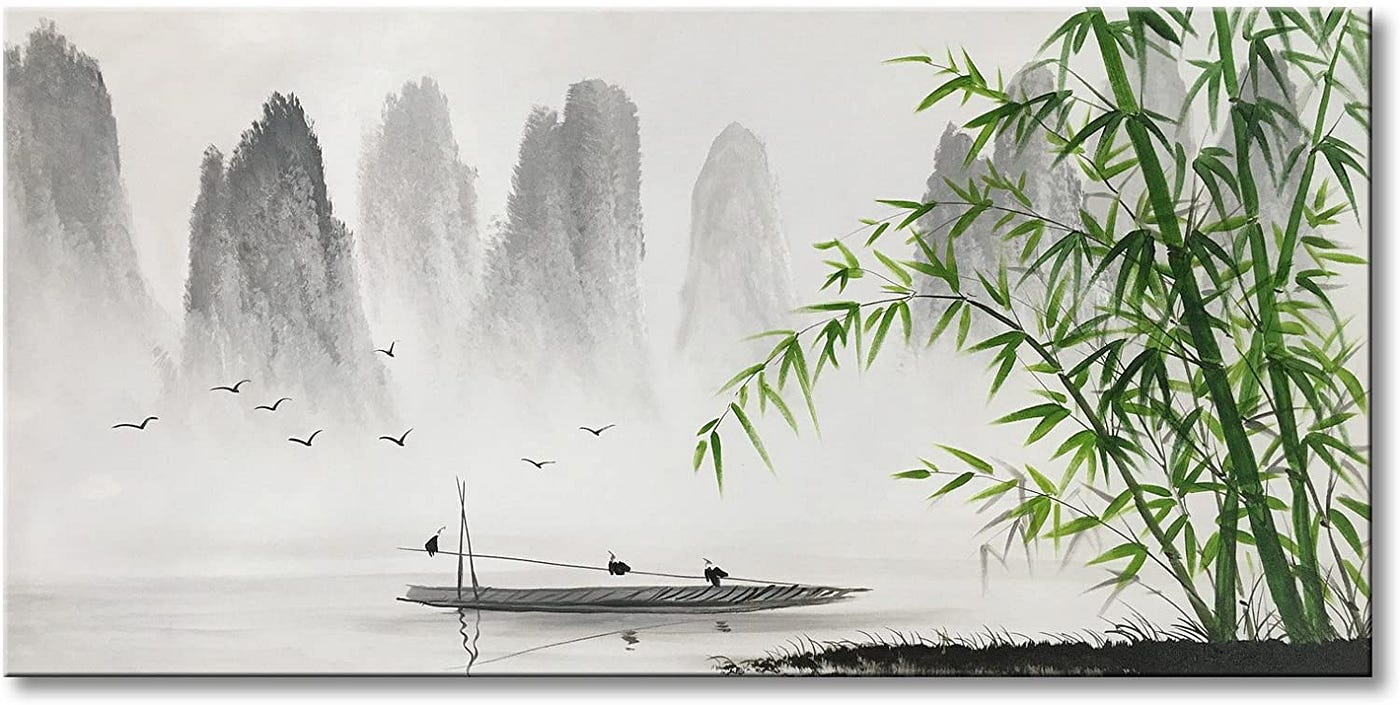
Typical Applications of Wu Wei in Daily Life
At Work: Avoiding Unnecessary Force and Burnout
In the modern workplace, the emphasis is often on productivity, deadlines, and constant achievement. This frequently leads to burnout as individuals push themselves to keep up with ever-growing demands. Wu Wei offers an alternative approach—one that encourages working with the natural flow of tasks and situations rather than against them.
Instead of forcing outcomes, those who practice Wu Wei at work recognize the value of timing and intuition. This means prioritizing tasks based on their urgency and natural progression rather than trying to tackle everything at once. For example, when faced with a challenging project, a person might take a step back, assess the situation calmly, and allow inspiration or the right solution to emerge naturally, rather than forcing a hurried or poorly thought-out solution.
Additionally, this mindset helps avoid overwork by encouraging individuals to conserve energy and focus on what truly matters. By not forcing progress or results, we create a healthier, more sustainable work environment where creativity and productivity flourish without excessive strain.
In Relationships: Creating Harmony Through Natural Flow
Wu Wei can also have a profound impact on how we approach relationships, whether romantic, familial, or professional. Relationships often suffer when one or both parties try to control interactions or outcomes. For example, someone may push for a resolution in a conflict, or rush to define a relationship, creating tension and resistance from the other party.
Wu Wei teaches us to let relationships develop naturally, without forcing them into predefined roles or outcomes. This involves practicing patience, allowing others to be themselves, and avoiding the need to micromanage conversations or situations. Instead of trying to make things happen on a set timeline, we trust the natural unfolding of interactions and connections.
In practice, this could mean allowing a difficult conversation to happen when both parties are ready, rather than pushing it to happen immediately. It also involves being present and responsive in the moment, rather than trying to anticipate or manipulate the next move. This creates a sense of harmony and mutual respect, allowing relationships to deepen organically.
In Personal Development: Identifying When to Act and When to Wait
Personal growth is another area where Wu Wei can be incredibly valuable. Many people approach self-improvement with a mindset of constant action, always seeking to do more, improve faster, or achieve specific milestones. However, this can lead to frustration and burnout, especially when results don’t come as quickly as expected.
Practicing Wu Wei in personal development means using mindfulness to identify the right time for action and the right time to wait. It involves recognizing that growth is not always linear, and that sometimes the best course of action is to step back and allow changes to happen naturally. For instance, instead of forcing oneself to stick rigidly to a self-improvement routine, Wu Wei suggests being flexible—knowing when to push forward and when to rest or reflect.
This approach creates a state of flow in personal development, where growth happens more organically and with less resistance. By trusting the process and being patient with oneself, one can avoid the frustration and disappointment that often comes from trying to force change before it’s ready.
Decision-making: Letting Instinct Guide the Moment
In decision-making, Wu Wei offers a refreshing alternative to the modern tendency to overthink and excessively deliberate over every choice. Many people spend a great deal of time weighing pros and cons, seeking to control every possible outcome and trying to make the “perfect” decision. This often leads to indecision, stress, and missed opportunities.
Wu Wei encourages us to make decisions with a sense of ease and trust in instinct. This doesn’t mean acting impulsively, but rather recognizing when enough information has been gathered and it’s time to make a move. By allowing decisions to arise naturally, without forcing them or obsessing over every detail, we can act with confidence and clarity.
For example, when faced with a career decision, instead of agonizing over every possible consequence, one might take a step back and trust their intuition. Wu Wei teaches that, in the right moment, the correct course of action will become clear, and the decision will feel effortless. This leads to more authentic and aligned choices, rather than ones driven by fear or over-analysis.
Wu Wei offers a framework for effortless engagement with daily life, helping individuals navigate work, relationships, personal growth, and decision-making with grace and ease. By avoiding the urge to force outcomes, we can create more harmonious environments—whether in the workplace or in personal interactions. In areas like personal development and decision-making, Wu Wei teaches us to trust the natural flow, allowing us to act when the time is right and to wait when necessary. This results in less stress, more clarity, and greater well-being as we move through life with a sense of flow and purpose.

Benefits of Practicing Wu Wei
Improved Mental Health: Reduced Stress, Anxiety, and Burnout
One of the most immediate and profound benefits of practicing Wu Wei is its impact on mental health. In today’s fast-paced world, stress, anxiety, and burnout have become pervasive problems. Constantly striving, pushing for results, and trying to control every outcome can lead to chronic mental strain. Wu Wei offers an antidote by teaching us to flow with life rather than against it.
By adopting the principle of non-forcing, individuals learn to let go of unnecessary pressure, allowing themselves to experience greater relaxation and peace of mind. Wu Wei helps to reduce the mental burden of overthinking and excessive worry, leading to a calmer, more centered approach to life. As a result, stress and anxiety levels decrease, and people are better equipped to handle challenges without becoming overwhelmed.
Furthermore, because Wu Wei emphasizes aligning with natural processes rather than fighting them, practitioners experience less burnout. Rather than depleting energy reserves through constant overexertion, Wu Wei encourages the conservation of energy by acting only when necessary and appropriate, allowing for periods of rest and recovery.
Increased Productivity: Effortless Efficiency
A surprising but consistent benefit of Wu Wei is increased productivity. While it may seem counterintuitive, many people find that when they stop forcing things and allow tasks and projects to unfold naturally, they actually become more productive. Wu Wei teaches that forcing results often leads to frustration, wasted effort, and diminished returns. When individuals align their actions with the flow of a situation, they achieve more with less effort.
This principle is particularly applicable in creative and professional environments. When individuals are constantly pressured to produce results, creativity can be stifled, and mistakes may be made in the rush to meet deadlines. In contrast, when space is given for ideas to develop organically, innovation and solutions arise effortlessly. This allows for more effective problem-solving and a smoother workflow, increasing overall productivity.
The principle of working smarter, not harder is at the core of Wu Wei. By focusing on what’s essential and avoiding unnecessary actions, individuals can accomplish more in less time, leading to both improved output and a more balanced life.
Better Relationships: Greater Harmony and Ease
Wu Wei also leads to better relationships, both personal and professional. Many interpersonal conflicts arise from trying to control others or forcing relationships to conform to our expectations. This creates tension, misunderstandings, and resentment.
In contrast, practicing Wu Wei encourages individuals to let go of control and allow relationships to develop naturally. By being present, mindful, and responsive rather than reactive, people can foster greater harmony and ease in their interactions. Wu Wei teaches us to approach relationships with patience and trust, avoiding the need to micromanage or rush the evolution of the connection.
This approach fosters a sense of mutual respect and understanding, as people are allowed the space to be themselves. It also helps resolve conflicts more peacefully, as individuals learn to step back and allow solutions to arise organically rather than forcing a resolution. As a result, relationships—whether with family, friends, or colleagues—become more balanced and fulfilling.
Enhanced Well-being: Balance, Happiness, and Inner Peace
Perhaps the most comprehensive benefit of practicing Wu Wei is the enhancement of overall well-being. By embracing the flow of life and reducing resistance, individuals cultivate a sense of inner peace that pervades every aspect of their lives. The practice of non-forcing allows for a balanced state of mind, free from the constant tension of trying to control external circumstances.
Wu Wei promotes happiness by encouraging individuals to find contentment in the present moment, rather than always striving for future achievements or outcomes. This mindset leads to a more joyful and fulfilling life, as practitioners learn to appreciate what they have and engage with the world around them without unnecessary struggle.
Additionally, the balance that Wu Wei fosters between action and rest contributes to physical and emotional well-being. When individuals stop pushing themselves to exhaustion and start flowing with the natural rhythms of life, they experience improved health, greater resilience, and a more harmonious existence.
The practice of Wu Wei offers a multitude of benefits, ranging from improved mental health to increased productivity and better relationships. By embracing the principle of non-forcing, individuals can reduce stress, anxiety, and burnout while simultaneously becoming more effective and efficient in their endeavors. Wu Wei also fosters greater harmony in relationships and leads to a life of balance, happiness, and inner peace. Whether applied to work, personal growth, or interpersonal interactions, Wu Wei promotes a more graceful and fulfilling way of living that aligns with the natural flow of life.

Parallels Between Wu Wei and Sanatana Dharma
Karma Yoga and Wu Wei: Detachment from the Fruits of Action
In Karma Yoga, one of the paths to liberation described in the Bhagavad Gita, the emphasis is on performing actions without attachment to their outcomes. This concept is closely aligned with the philosophy of Wu Wei, which teaches that actions should be carried out in harmony with the natural flow, without force or expectation of specific results. In both traditions, the focus is on the process of action, rather than on its ultimate reward.
In Karma Yoga, Lord Krishna advises Arjuna to perform his duties without attachment to success or failure, as this detachment frees the individual from the bondage of karma (the cycle of cause and effect). Similarly, Wu Wei encourages individuals to act without the ego-driven desire to control the outcome, trusting that by acting in alignment with nature, the results will take care of themselves. In this way, both Karma Yoga and Wu Wei emphasize mindful action, guided by purpose and clarity, but without anxiety about what the action will achieve.
Surrender to the Divine Will: Ishvara Pranidhana as Wu Wei
Another parallel between Wu Wei and Sanatana Dharma can be found in the practice of Ishvara pranidhana, or surrender to the will of the Divine, a concept central to both Hindu philosophy and the Yoga Sutras of Patanjali. This principle involves letting go of personal desires and ego-driven goals, and instead surrendering to a higher cosmic order or divine will. In this way, individuals align their actions with the greater flow of life.
Wu Wei, though not explicitly theistic, shares this idea of surrendering to a larger force—the Tao, or the way of the universe. In both Wu Wei and Ishvara pranidhana, there is an understanding that trying to impose one’s will on reality often leads to resistance and suffering. By releasing attachment to specific outcomes and trusting in a higher power or natural flow, individuals can live with greater ease, clarity, and inner peace.
Both traditions recognize that true freedom comes not from controlling life’s circumstances but from surrendering to them, allowing oneself to act effortlessly and harmoniously within the grand design of existence.
Balance Between Action and Inaction: The Bhagavad Gita’s Teaching
In the Bhagavad Gita, Lord Krishna emphasizes the importance of right action without attachment to the outcome. This teaching closely mirrors the concept of Wu Wei, which is about effortless action—acting in a way that is in harmony with nature and the moment, rather than forcing outcomes or withdrawing into inaction.
The Gita teaches that inaction is not a valid option; life requires action, but that action must be performed with a spirit of detachment and equanimity. Similarly, Wu Wei does not advocate for laziness or passivity, but rather for the kind of action that arises naturally and effortlessly when we are aligned with the flow of life. Both philosophies emphasize the need to avoid extremes—whether of overexertion or complete withdrawal—and instead find a balance between action and non-action.
This balance allows individuals to engage with the world fully and mindfully, performing their duties with focus and intention, but without the anxiety and tension that often accompanies striving for results. Both teachings encourage living in the present moment, responding to the needs of the situation without the burden of unnecessary expectations.
The parallels between Wu Wei and Sanatana Dharma highlight the universality of the principles of detachment, surrender, and balanced action. Both traditions teach that life flows more smoothly when we let go of ego-driven control and instead act in alignment with a higher order—whether that be the Tao or divine will. Through the practices of Karma Yoga, surrender to the divine, and mindful action without attachment, individuals can live with greater peace, purpose, and harmony, free from the stress and suffering that comes from trying to force outcomes. In both Wu Wei and Sanatana Dharma, we find a shared wisdom about how to engage with life in a way that is effortless and aligned with the deeper rhythms of existence.

Conclusion
Summary of Key Takeaways
Wu Wei, a fundamental concept in Taoist philosophy, revolves around the idea of effortless action and harmonious living. It teaches us to find the natural flow of life, learning when to act and when to step back. This approach fosters a sense of balance, allowing individuals to engage with the world in a way that is both effective and serene. Key takeaways include:
- Effortless Flow: Embracing a mindset that aligns with the natural order of things, avoiding unnecessary force and struggle.
- Balance and Harmony: Understanding when to act and when to wait, promoting a more balanced and less stressful approach to life.
- Enhanced Well-being: Experiencing reduced stress and increased productivity, along with improved relationships and overall happiness.
Relevance in the Modern World
In today’s high-pressure culture, where constant productivity and achievement are often prioritized, the practice of Wu Wei offers a refreshing and necessary counterbalance. By embracing Wu Wei, individuals can:
- Counteract Burnout: Move away from the relentless hustle and recognize the importance of rest and natural rhythm.
- Foster Mental Well-being: Reduce stress and anxiety by engaging with life in a more relaxed and harmonious way.
- Improve Decision-making: Enhance creativity and clarity by allowing decisions to emerge naturally rather than forcing them.
Incorporating Wu Wei into daily life provides a pathway to a more balanced, fulfilling, and peaceful existence, aligning actions with the natural flow of life rather than resisting or controlling it.
By supporting the MEDA Foundation, you contribute to a world that embodies the principles of mindfulness, self-sufficiency, and universal love—values that resonate deeply with the philosophy of Wu Wei. Your involvement helps us foster environments where individuals, particularly those on the autism spectrum, can thrive and achieve their fullest potential. Join us in our mission to create a self-sustaining ecosystem of support and empowerment.
Book References
- “Tao Te Ching” by Laozi: The seminal text on Taoist philosophy that introduces and elaborates on the concept of Wu Wei.
- “The Book of Chuang Tzu”: Offers additional insights into Taoist principles and the practice of Wu Wei.
- “The Bhagavad Gita”: Provides a parallel perspective on non-attachment and right action in the context of Sanatana Dharma.
- “The Way of the Tao” by Lao Tzu and David Hinton: A modern interpretation that brings Wu Wei into contemporary relevance.
